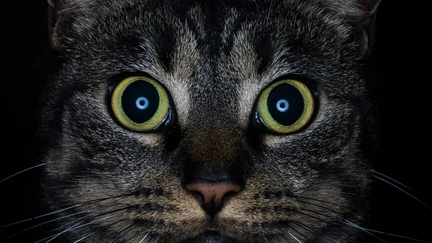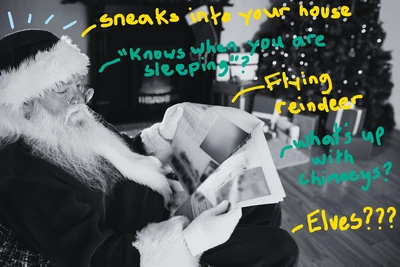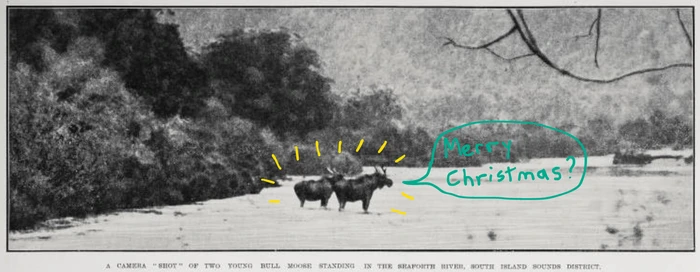Christmas Cryptids & Festive Folklore: A Librarian's Guide
Ah Christmas, that delightful season of pine-scented air fresheners, "oh yes I love socks", and Typo's controversial range of Christmas ornaments. A time for togetherness with...a haunting underbelly?

For most of us, Christmas is a fairly vanilla, tinselly affair. We spend time with our family and friends, we eat a wonderfully large amount of food, we exchange gifts. And don't get me wrong - I love Christmas, but a good part of that love comes from knowing a few of the more dubious, bizarre, and (dare I say?) ooky spooky stories surrounding the festive season.
Having recently realized the extent to which Santa Claus has become a symbol for Western consumerism perpetuated by a wealthy white man with a problematic labour-force, I am refusing to make a case for SC as a cryptid. HOWEVER, this just leaves more space to introduce you to a far more intriguing cast of Christmas cryptids...

For those new to the Wellington City Libraries Cryptozoological Society, a cryptid is an animal or entity whose existence hasn’t been conclusively proven (to give you an example, the prom king and queen of cryptids would definitely be Bigfoot and the Loch Ness Monster).
Krampus
The Anti-Santa himself, Krampus (from the German krampen, meaning 'claw') is a popular figure in festive European mythology. Depicted as an anthropomorphic half-goat/half-demon, Krampus decided that coal simply wasn't enough to discourage misbehaviour, and - according to legend - punishes bad children by either a) beating them with sticks and switches, b) dragging them to hell, or c) eating them. Feel free to tag yourself.
Jólakötturinn
The Jólakötturinn (pronounced 'yola-ka-turin'), or Yule Cat, originates from Icelandic legend, and is another rather ominous figure in the ranks of supernatural beings judging your behaviour. Unlike Krampus, however, Jólakötturinn has a very specific rhetoric for measuring naughty/nice: Have you been given new clothes this Christmas? If so, you're safe. If not, then you risk being eaten by the house-sized Yule Cat.
In accordance with Icelandic tradition, children who finish their chores in time for Christmas are given new clothing as a reward. Jólakötturinn, peering through the windows on Christmas night and seeing new clothes, may deduce that the child is good. No new clothes = indisputable immorality of child = get eaten by an enormous supernatural cat.
The Yule Lads
First of all, a moment of appreciation for the name 'The Yule Lads'. I did not make that up.
Originating from the same mythology as the Jólakötturinn (the Yule Lads' parents are actually the proud owners of the Yule Cat), the Yule Lads are a group of 13 trolls, each of whom has a distinct name and personality, which refers to their favourite way of causing mischief. Special mention to Pottaskefill (Pot-Scraper) for coming to steal everyone's left-overs. Over the 13 nights leading up to Christmas, the Yule Lads take turns visiting households, leaving candy in the shoes of good children, and rotting potatoes in the shoes of bad children.
The Fiordland Moose
I've discussed the Fiordland Moose previously, but I figured they deserve an honourable mention for being the closest thing Aotearoa has to a mythical reindeer. To summarise, several moose were released into Fiordland in 1910. The sporadic sightings and evidence found in the past 112 years have been enough to keep people wondering if these elusive moose are still out there. With enough public pressure, maybe we can bully the moose out of hiding and convince them to start leaving candy in our shoes at Christmas.

Original image from Auckland Libraries Heritage Collections.
And because this is not, in fact, just a place for me to rant about cryptids - come down to your local library to check out our collection of Christmas cryptozoology and festive folklore!
- Cryptid Club / Andersen, Sarah (ebook)
- The mystery chronicles : more real-life X-files / Nickell, Joe
- Monsters : a bestiary of the bizarre / Dell, Christopher
- On monsters : an unnatural history of our worst fears / Asma, Stephen T
- Mythical monsters : mad, mischievious, mysterious creatures / Smith, Lauren
- Unnatural creatures (ebook)
- Norse mythology / Gaiman, Neil (eaudiobook Borrowbox , eaudiobook Libby )
- Ghosts of Christmas past
- The mothman prophecies / Keel, John A
- Chill tidings : dark tales of the Christmas season